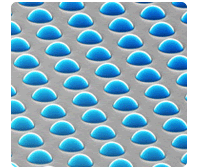Illumina, a publicly traded company since 2000, was founded by scientists at Tufts University in Boston in 1998 after their invention of a BeadArray technology useful for genetic assays. Illumina’s mission is to develop technology capable of large-scale analyses of genetic variation and function, which may provide crucial information necessary to create individually personalized medicine. Unlike traditional medicine, which relies on the treatment of observable symptoms, personalized medicine uses information of the genetic makeup of individuals to determine their risk to diseases and succeptability to the cures or side effects of a drug. Illumina looks to capitalize on this trend of genetically personalized medicine and provide genetic diagnostic tools at a high quality level. Illumina earned $40M of gross profit from $185M in revenue in 2006 and was named as Forbes fastest growing tech company.
Illumina.com
Technology

Illumina's original assay system is the BeadArray technology assay (shown in figure). In this assay, small 3 micrometer silica beads containing hundreds of thousands of nucleotide sequences self-assemble onto slides and bind DNA or RNA. This array system can be used to genotype DNA or RNA to determine a patient's genetic predispositions to certain diseases.
The solexa sequencing system was also developed by Illumina as a tool for sequencing DNA samples. The system captures DNA fragments and amplifies them a considerable amount before determining their sequence through use of multicolored fluorescence tags coordinated to specific bases of the DNA. These technologies can be used to determine the health profiles of patients as well as to determine the biomarkers that may predict a potential drug's efficacy or toxicity. Thus this personalized medicine technology is both geared directly towards patients and towards the development of drugs that may cure diseases in the future.
Products
Illumina has a large array of products. Here are some of the most prominent ones:
Beadstation 500- This system uses the BeadArray technology to perform genetic assays on samples of DNA or RNA.
Beadlab 1000/2000- These systems are used for very high throughput assays capable of creating around 1 million genotypes per day.
Genome Analyzer- This system uses a parallel processing approach to sequence gene fragments at a very high throughput level.
News
7.1.2000- Illumina IPOs and raises over $100 million.
12.1.1999- Illumina closes a $28 million Series C financing.
11.1.1998- Illumina receives an initial round of funding of $8.6 million to develop their core technology
Collaborations
11.1.2006- Illumina acquires Solexa, the leading genomic-scale sequencing technology, in a stock-for-stock merger of 0.334 Ilumina stock for each Solexa share.
4.11.2005- Illumina announces the completion of its acquisition of CyVera Corporation for $17.5M in both stock and cash. CyVera is the developer of the VeraCode technology that Illumina uses.
FIGURE from Illumina.com

2 comments:
I am wondering if California will continue to be the place to go for nano startups based on theinvestment that the state is making in science, ie. stem cell research. Does the science/business prospects of nano-technology fundamentally intersect with stem cells? d.r.
California has historically been a hub for innovation and a facilitator for the transfer of science to industry. The atmosphere that Silicon Valley creates - an unparalleled atmosphere of creativity and entrepreneurship - combined with the plethora of high caliber research universities in CA will probably make the state a leader in high-tech business for years to come. That said, other areas such as Boston, Texas, and Chicago are spinning off a good amount of nanotech companies. It seems to me that the key to such industry growth lies in good universities with good programs allowing researchers to spin their ideas off into the market.
I do believe that stem cells and nanotech will intersect quite a bit in the near future. I forsee immune-rejection problems with stem cell implants that may be mitigated by nanotechnology. Imagine a nano-coating with proteins designed to "trick" our immune system into thinking that the stem cells are our own. Nanotechnology may not fundamentally link with stem cells, but the overarching concept of nanoscale manipulation will certainly benefit stem cells as well as countless other applications.
Post a Comment